The Role of Attorneys in Social Justice Advocacy

Lawyers play a vital role in advocacy for social justice by offering legal knowledge and representation to individuals and societies seeking claim their rights. In a world where legal matters often intersect with questions of fairness, legal professionals serve as essential allies for those affected by discrimination, unfairness, and systemic injustices. They assist direct the challenges of the legal system, amplifying marginalized voices and ensuring that everyone has access to the justice they deserve.
In this article, we will explore the multifaceted roles that lawyers take on within social justice endeavors. From learning about personal injury law and renter's rights to leading clients through the legal process in defending accused individuals, attorneys provide crucial support in a range of fields of law. We will also address important legal tips everyone should know, expectations during your first legal meeting, and the most common legal errors people make. By the end, you will have a better perspective on how attorneys contribute not only to individual cases but also to wider societal change.
Legal Information for Everyone
Traversing the judicial environment can be daunting, but everyone should have a basic understanding of their entitlements and obligations. One critical aspect is knowing when to retain an attorney. Whether Click here for more facing a personal injury case, a domestic relations issue, or a business dispute, identifying when expert legal assistance is necessary can significantly impact the result of your case. Attorneys not only provide expertise but also help you navigate intricate legal processes.
Another important area to consider is the frequent legal errors individuals make. Numerous individuals attempt to address legal matters on their own, leading to oversights or misunderstandings that could have been avoided with proper counsel. Understanding what these mistakes are can help you steer clear of traps that might jeopardize your case. Educating yourself about these errors can enable you to make wise decisions when legal issues arise.
Additionally, knowledge of your rights can greatly improve your legal standing. For instance, knowing your rights during a police stop or as an employee can prepare you for encounters with law enforcement or employers. Knowledge of these rights can play a pivotal role in safeguarding yourself and ensuring that you get fair treatment. Connecting with legal resources early on can lead to more favorable outcomes and foster confidence in managing legal matters.
Understanding Your Lawful Entitlements
Comprehending your legal rights is vital for maneuvering through the complexities of the law. If you are facing a bodily harm, facing employment issues, or needing assistance with family law, knowing your rights enables you to advocate for yourself effectively. For illustration, if you are approached by law enforcement, being aware of your rights, such as the right to remain silent and the right to an attorney, can greatly impact the result of your situation.
In employment situations, it is crucial to be informed about what rights you have as an employee. These rights involve just treatment, the right to safe working conditions, and protections against discrimination. If you feel that your rights as an employee have been violated, understanding the legal protections available to you can assist you take correct action and seek redress. Meeting with an attorney can clarify these rights and guide you on the next steps.
Additionally, in landlord-tenant relationships, knowing your rights can avert misunderstandings and conflicts. Tenants have distinct rights regarding safety, privacy, and habitability. Landlords, on the other hand, have the right to collect rent and maintain their property. Informing yourself about these rights can promote a more harmonious living situation and verify that legal obligations are met on both sides. Hiring a lawyer who specializes in tenant rights can provide additional support and guidance.
Steering Through the Legal Process
Understanding the legal procedure can be overwhelming, but having a defined roadmap can help ease some of the anxiety. Regardless of whether you are entangled in a civil lawsuit or exploring a family law matter, being aware what to expect can help you handle the intricacies. Begin by acquainting yourself with key legal terms and procedures, as this understanding will enable you to engage more efficiently with your attorney and make knowledgeable decisions.
Selecting the right attorney is important for navigating any legal scenario effectively. When looking for representation, evaluate the practice area that corresponds with your specific needs, be it tort law, family law, or criminal law. During Visit website , discuss your case information openly, and be ready to ask questions about their background and methodology. This meeting is vital, as it establishes the foundation for your professional relationship and helps you assess if they grasp your goals.

As you move through the legal process, keeping organized documentation and clear communication with your attorney will be critical. Keep track of all communication, deadlines, and records from meetings. If circumstances change or new information arises, promptly update your lawyer. Staying engaged and informed will not only help your case but also give you greater peace of mind during what can be a challenging time.
